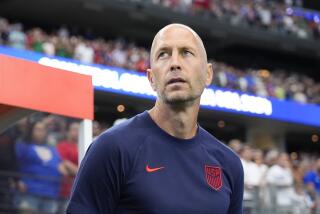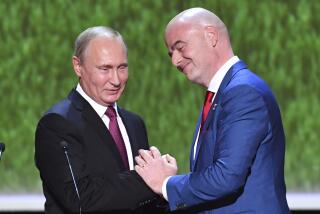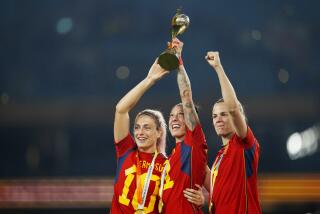Political Football Bounces to Africa
- Share via
Ouagadougou, Burkina Faso, is a dateline any writer worth his salt would yearn to have on a story, conjuring up, as it does, images of Joseph Conrad and Graham Greene or, more recently, Bruce Chatwin and Redmond O’Hanlon.
Between now and Feb. 28, however, it’s a dateline that will be used by many of the top sportswriters in Africa, as well as a handful from Europe, who have traveled to the West African country once known as Upper Volta to cover the 21st African Nations Cup.
Coming as it does only four months before the World Cup, the three-week, 16-nation championship is of particular interest as a gauge of the continent’s France ’98 challenge.
In addition, there is a political agenda to consider. Each of the candidates and likely candidates for the FIFA presidency will make an appearance to solicit African support for his bid.
Already, Sweden’s Lennart Johansson has stopped by to point out the ever-strengthening bond that has developed between UEFA, the European confederation he heads, and CAF, the African confederation headed by another possible candidate, Issa Hayatou of Cameroon.
Joseph “Sepp” Blatter, FIFA’s general secretary, also is expected in Burkina Faso soon to court support for his probable run at the presidency in June. Others might follow, although no serious names have yet surfaced and Johansson is so far the only officially declared candidate to succeed Brazil’s Joao Havelange, who is stepping down after 24 years.
More interesting, albeit less important in the long run, are the games themselves. Four of the five African nations that have qualified for the World Cup are taking part--defending champion South Africa, favorite Morocco, Cameroon and Tunisia.
The fifth France ’98 team, Olympic gold medalist Nigeria, is noticeable by its absence, having been banned from this tournament because it refused to take part in the last African Nations Cup in South Africa in 1996 in a purely political bit of showmanship by the military dictatorship that rules Nigeria.
As a result, Bora Milutinovic and his latest World Cup wonders will not be doing any sightseeing in Ouagadougou. But they already have made a mark this year, following up their victory over Iran two weeks ago with another over Hong Kong.
Meanwhile, the most colorful and exuberant of the continental championships will not be lacking in interesting characters.
Among the coaches, nine of whom are European, there is, for example, Burkina Faso’s Philippe Troussier, a Frenchman who earned the sobriquet “White Witchdoctor” while in charge of Nigeria before he ran afoul of the military regime and was ousted. Troussier is on a short-term contract. Once the Nations Cup is over, he takes charge as South Africa’s World Cup coach.
Then there is Egypt’s Mahmoud al-Gohary, a former army colonel who led his country to the 1990 World Cup in Italy. He might be a no-nonsense kind of coach, but for sheer discipline no one approached Zambia’s German coach, Burkhard Ziese. Asked once why he had cut a particular player, Ziese shot back: “The midfield is not a dance floor.”
Morocco, ranked No. 1 in Africa and the favorite to win this tournament, has as its coach Henri Michel, who guided his native France to third place in the 1986 World Cup in Mexico.
Michel went on to coach Cameroon in the 1994 World Cup in the U.S. only to see it fall apart because of internal bickering. Jean-Manga Onguene, Africa’s player of the year in 1980, is now in charge, but the team has a long way to go before being ready for France.
Cameroon does have one of the potential stars of the tournament, however, in Patrick “Typhoon” Mboma, the top goal scorer in Japan’s J-League last season with 27 goals for Gamba Osaka.
Others who could make a name for themselves in the coming weeks are forward Aboubacar “Titi” Camara of Guinea, 17-year-old Burkina Faso striker Mamadou Zongo, forward Benni McCarthy of South Africa, and strikers Fabrice “Akwa” Maieco of Angola and Eric Addo of Ghana.
The show got under way Saturday when Burkina Faso, the host nation, lost to Cameroon, 1-0, in the 40,000-seat, Chinese-built stadium in the magic dateline of Ouagadougou.
‘BREAKING’ NEWS
The World Cup ’98 hopes of at least two players were dashed in the past week, while those of another four suffered setbacks.
In Spain, the France ’98 dreams of Brazil’s Juninho were effectively ended when he suffered a broken leg while playing for Atletico Madrid against Celta Vigo. It was a crude tackle by defender Michel Salgado that caused the damage. Juninho will be sidelined for at least five months, thus missing the June 10-July 12 tournament.
Italy’s Ciro Ferrara, of Juventus, was the equally unfortunate victim of an on-field clash. The defender will not be going to France after breaking his left leg in two places when he and Lecce’s Alessandro Conticchio both lunged for a 50-50 ball. Ferrara is lost for the season.
Germany’s 1990 World Cup-winning and 1996 European Championship-winning striker Juergen Klinsmann fractured his jaw in a collision while playing for his English team, Tottenham Hotspur, against Barnsley and will be sidelined for several weeks.
The accident occurred only a day or so after Germany’s coach, Berti Vogts, had included Klinsmann in the provisional list of 40 players from which he will select 22 to go to France.
Less serious was the injury to another potential World Cup player, Spain’s Raul Gonzalez, who will be lost to Real Madrid for three weeks while recovering from a groin injury. Out for a similar period is England goalkeeper David Seaman, who chipped a bone in his finger while playing for Arsenal against Coventry.
Also sidelined for three weeks or more is Chile’s Ivan Zamorano, who strained a muscle in his right leg while playing for Inter Milan against Brescia. Zamorano will miss Chile’s World Cup warm-up games against Australia, England, South Korea and Japan.
WORLD CUP WATCH
Along the France ’98 trail . . .
The World Cup will open in Paris on June 10 with Brazil playing Scotland, which is why Scotland’s coach, Craig Brown, was in Miami last week to see Jamaica hold the Brazilians to a 0-0 tie in the CONCACAF Gold Cup.
Brown’s assessment: “I thought Brazil played well. They are still an outstanding team. They could have scored three or four goals--there was some superb goalkeeping [by Jamaica’s Warren Barrett]. It was just as you would expect the world champions to play. I think we [Scotland] would have beaten Jamaica. I’m not so sure about Brazil.”
In the dying minutes of that game, Brazilian defender Junior Bainano elbowed an opponent in the face and was immediately red-carded by U.S. referee Esfandiar Baharmast. Bainano was suspended for two games and will be eligible to play in the tournament only if Brazil reaches the final or third-place game.
Baharmast, of Aurora, Colo., last week became the only American referee selected to officiate in the World Cup when FIFA named its list of 34 referees and 33 linesmen for France ’98.
THEY SAID IT
One of the more memorable quotes so far this year was uttered by former German international Karl Heinz Rummenigge, now vice-president of Bayern Munich.
In the latest round in an ongoing feud between the Bundesliga club and player agent Andre Gross, this time over Bayern defender Markus Babbel, who wants more money, Rummenigge slammed Gross.
“He is not the sort of person we want to sit with at the same table,” he said. “As far as I am concerned, he [Babbel] can seek advice from Saddam Hussein, but we will only negotiate with the player alone.”
In other words, Gross has been given Das Boot.
More to Read
Go beyond the scoreboard
Get the latest on L.A.'s teams in the daily Sports Report newsletter.
You may occasionally receive promotional content from the Los Angeles Times.







